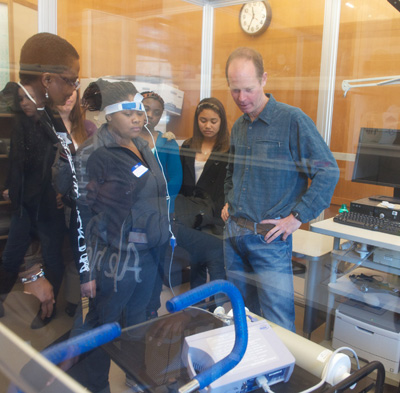On Wednesday, March 28, seventy tenth-graders from Nottingham High School on Syracuse’s east side visited Syracuse University to learn about and get a feel for the campus where they could live and study at in the future. The School of Education’s Early College High School program at Nottingham (NECHS) brought its scholars to visit the SU campus to get a personalized tour of the university and its colleges, and learn more about the academic programs and courses of study that will be available to them as college students. The scholars began the day with a tour of the Schine Student Center. Then, School of Education Dean Douglas Biklen and Director of Student Support Services Robert Wilson welcomed the scholars in Huntington Hall.
Wilson addressed the financial benefits of a college education, calling it the “million dollar bonus.” “That is the average difference in lifetime earnings between a high school graduate and a college graduate,” he tells the students. “What do you have to do to get it?”
He encouraged the students to choose challenging coursework, earn good grades and test scores, and be involved in extra-curricular programs, leadership activities, and make contributions to community. “These are the characteristics that Syracuse University admissions, and any college admissions office, will be looking for,” Wilson says.
The group then split up to participate in content-specific tours and workshops at some of the schools and colleges on campus, guided by SU faculty and staff. Connecting with deans, faculty, and undergraduate and graduate students, the scholars learned about the opportunities that await them at SU and how the work they’re doing in high school and with NECHS prepares them for what’s to come. The tours allowed scholars to participate in some of the most engaging opportunities SU: hands-on data collection in exercise science and engineering laboratory facilities; an opportunity to feel the lights of the Syracuse Stage; workshops about careers in sports management and education; creating projects in design studios; and discovering what happens behind the scenes in careers in broadcast and digital journalism.

During the School of Education tour, doctoral student Melanie Carroll led a group of the scholars through a brainstorming exercise that addressed career preparation and readiness. Carroll says the scholars engaged with each other and the SU mentors, and showed how invested they were in their educational careers.
“I was incredibly impressed by their clear articulation of career objectives,” Carroll says. “They identified community and school resources they can access and asked good questions.”
NECHS grew from a grant by the Woodrow Wilson Foundation and is now a fully-inclusive program to boost graduation rates and prepare students for successful college careers. The program helps students realize their full potential in a college atmosphere by committing to serve underrepresented students in higher education; developing a program for students to earn transferable college credit in high school; engaging students in social and academic support systems; and providing writing, science, and math for teacher professional development.
Jeffery Mangram, assistant professor of teaching & leadership in the School of Education, leads NECHS and credits the success of the program to the shared commitment of the students, faculty, and administration to consistently challenge each other.
“These commitments and assumptions are embedded in the DNA of a school,” Mangram says. “We make sure students are engaging in academically rigorous courses to prepare them to do well in college.”
Lauren Shallish, a School of Education doctoral student and a coordinator of NECHS, says that the visit was a chance for both NECHS scholars and the SU community to see how their work fits together for the success of high school students.
“Our tenth graders learned about the breadth and depth of career programs and degree requirements while Syracuse University learned more about the academically rich and talented community that is Nottingham High School,” Shallish says.
